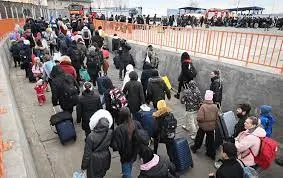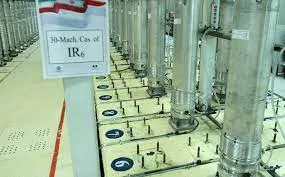The United Nations, the International Organization for Migration and Amnesty International have criticized the racism, discrimination and ill-treatment of foreigners fleeing Ukraine following the Russian military intervention compared to their Ukrainian counterparts in the countries where they sought refuge.
The United Nations said Thursday it was "shocked" at reports that Asians and Africans fleeing the war in Ukraine were "discriminated and ill-treated" on ethnic grounds.
This came in a press conference held by the spokesman for the Secretary-General of the United Nations, Stephane Dujarric, at the permanent headquarters of the International Organization in New York.
"The Secretary-General is shocked by reports that non-Ukrainians fleeing hostilities in this country have been subjected to harassment and discriminatory treatment because of their skin colour," Dujarric said.
He pointed out that the United Nations had "credible and credible information from our humanitarian partners on the Ukrainian border that documented the mistreatment of people of many nationalities, because of their race, color and nationality."
"We are also aware of testimonies posted on social media by Africans, Middle Easterners and Asians," Dujarric added.
He explained that "the United Nations raised this issue with a number of leaders of Ukraine's neighboring countries and they pledged to us to discuss this issue, which was not supposed to happen in the first place."
In a related context, the UN spokesperson expected the number of people fleeing their homes in Ukraine to reach 10 million.
"Although the scale and scope of the mass displacement of civilians from Ukraine is not yet clear, we expect that more than 10 million people may flee their homes if the current violence continues, including 4 million people who may cross the border into neighboring countries," he said.
Commenting on the accusations made by Russian Defense Minister Sergei Shoigu two days ago during a press conference in the capital, Moscow, of using Ukrainian forces as human shields in the ongoing clashes, the UN spokesman denied the authenticity of these reports, saying: "We have not seen evidence to indicate that."
At the same time, Dujarric revealed contacts with the Russian Defense Ministry aimed at ensuring the safety of UN personnel working in the humanitarian field in Ukraine.
"We are aware of the establishment by the Russian Defense Ministry of the Humanitarian Response Coordination Center on Ukraine, and we are in discussions with them on this," he added.
"Humanitarian needs in Ukraine are increasing hour by hour, and we are in contact with the Russian Ministry of Defense and with the Ukrainian authorities regarding the movements of relief convoys and ensuring the safety of humanitarian workers," Dujarric added.
With the increase in enriched uranium stocks, is Iran close to making a nuclear weapon?
A report issued by the International Atomic Energy Agency revealed that Iran's stockpile of enriched uranium has reached a level close to the level needed to produce nuclear weapons.
A report issued by the International Atomic Energy Agency on Thursday revealed that Iran's stockpile of enriched uranium is increasing to the point that highly enriched material has approached the percentage needed to make a nuclear bomb, according to common standards.
Iran maintains stockpiles of enriched uranium in contravention of the terms of the 2015 nuclear deal.
And that amount was announced in the quarterly report of the International Atomic Energy Agency, which it submits to member states, at a time when negotiators in talks aimed at saving the nuclear agreement said that they are in the last stage of reaching a consensus, according to Reuters.
Western powers have warned that time is running out for talks that will be meaningless if progress in Iran's nuclear program reaches a certain degree.
The report added that Iran's stock of uranium hexafluoride, which feeds centrifuges and devices that enrich uranium, includes 33.2 kg of uranium enriched to a purity of up to 60 percent, which is an increase of 15.5 kg.
Earlier on Thursday, a senior diplomat said that Iran's stockpile of uranium enriched to a point close to producing a nuclear weapon is about three-quarters of the amount needed to make one nuclear bomb if the enrichment was to a greater degree, according to what is widely known, according to Reuters.
The quantity needed to make a bomb is set at 25 kilograms of 90 percent enriched uranium, although the senior diplomat questioned the reliability of this.
The nuclear agreement signed between Iran and world powers in 2015 imposed restrictions on Tehran's nuclear activities in return for the lifting of international sanctions imposed on it.
In 2018, former US President Donald Trump withdrew his country from the nuclear agreement and reimposed severe economic sanctions on Iran, prompting Tehran to violate the nuclear restrictions of the agreement.
Those violations included exceeding the permissible limit for the purity of uranium enrichment set in the agreement at 3.67 percent, and exceeding stocks of enriched uranium set by the agreement as 202.8 kilograms.
The latest report showed on Thursday that the total stockpiles of enriched uranium are currently 3.2 tons, an increase of 707.4 kg in a quarter of a year, but that stock is still less than what Iran had accumulated before the nuclear agreement, which exceeded five tons, but the maximum purity rate at that time was 20 percent.
The report is one of two reports that are usually issued simultaneously, and the other focuses on outstanding issues regarding nuclear materials that the International Atomic Energy Agency suspects that Iran has not disclosed.
The agency found uranium traces in three apparently ancient sites, but Iran never disclosed them. The agency requests answers from Iran, but it has repeatedly said that Tehran did not provide satisfactory answers.
Diplomats say this is one of the main remaining obstacles to reviving the nuclear deal.
Iran wants to end the International Atomic Energy Agency's investigation as part of an agreement, but Western powers say this goes beyond the scope of the original agreement, and the agency is not a party to the agreement.
The Director-General of the International Atomic Energy Agency, Rafael Grossi, is scheduled to visit Iran on Saturday, hoping to agree on a "process" that will lead to the end of the investigation, paving the way for a broader agreement, according to diplomats. The release of the second report from the agency has been postponed until the end of that visit.
Tags:
america
american citizen
american city
american island
argentina
brazilian amazon
latin america
latin american
mexican
mexico
north america


